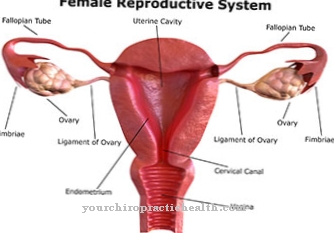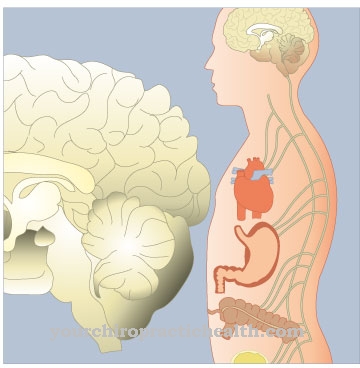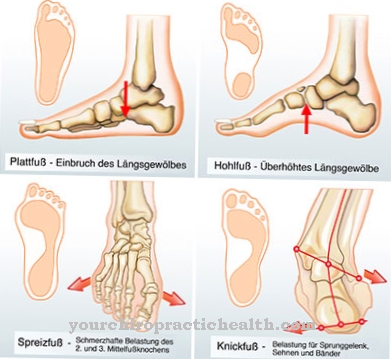It happened quickly: for a moment you don't pay attention, fall and fall awkwardly or you bump yourself somewhere. Most of the time the pain subsides quickly. But if you have persistent pain in the costal arch, it may be Rib contusion (rib contusion) act.
What is a bruised rib?

Under one Bruised ribs one understands an externally inflicted blunt injury or impairment on the bony ribs. In contrast to a rib fracture, when a rib is bruised, these forces are not so strong that the ribs break, but rather it remains on the border of the fracture.
The tissue in front of the ribs is squeezed in a rib bruise. This bruising leads to swelling and irritation of the nerve endings in the area of the periosteum. With a bruised rib, those affected usually feel pain in the rib area, which can cause them difficulty breathing and everyday activities. Often they take a relieving posture because of the pain.
causes
A Bruised ribs is most common in people who use their bodies a lot. Martial artists such as boxers or athletes in team sports (e.g. handball or soccer) are particularly affected because they are in constant body contact and blows with other players.
Athletes in sports with an increased risk of falling, such as skiing or mountain biking, are also at risk of bruising their ribs. In older people, fractures are more likely than rib bruises due to the age-related lower elasticity of the bones.
Symptoms, ailments & signs
A bruise of the ribs is usually associated with very clear and typical symptoms that are perceived as very painful by the person concerned. Even the smallest movements cause severe pain, which persists even when you are at rest. Affected people often complain of shortness of breath because breathing in and out is extremely uncomfortable with a bruised rib.
If, in addition to the bruised ribs, there is also an annoying and dry cough, the pain can become considerably worse. In most cases, the pain not only occurs directly in the area of the bruise, but the entire chest is affected. The affected person often takes a tense deformity, so that it can even lead to severe back pain.
Unfortunately, medical or drug treatment is of limited help in the case of an existing bruised rib. The existing pain can be effectively alleviated by using commercially available painkillers. However, this is the only tool that can be used to combat existing symptoms.
Physical activity should be reduced, as otherwise the pain can become significantly worse. The more rest the body is given, the faster the healing process can progress with an existing bruised rib.
Diagnosis & course
A Bruised ribs If there is persistent discomfort in the rib area, a thorough examination should always be carried out to determine whether it is actually a bruised rib or a rib fracture.
The diagnosis of bruised ribs is not that easy, and even an experienced doctor cannot easily feel it through the manual examination. Even with an X-ray examination, it is not easy to differentiate between a bruised rib and a fractured rib.
A rib fracture can lead to internal injuries, such as a pneumothorax due to the injury to the lung membrane, with sometimes life-threatening consequences. In the case of pneumothorax, air penetrates from the lungs into the pleural space, which is actually empty of air. As a result, the lungs can no longer properly expand while breathing and gas exchange is hindered, which can lead to serious complications such as cardiopulmonary failure in tension pneumothorax.
The course of a rib bruise depends on the extent of the injury. A bruised rib must be healed calmly so that the tissue can recover. A bruised rib usually takes about 3 to 4 weeks to heal. During this time you have to refrain from all activities that strain the thorax, such as heavy lifting, abrupt turning movements, etc. Athletes in particular have to adhere to them, but they only start again too often and too quickly after a bruised rib with the training.
Complications
If there are internal injuries due to the bruised ribs, life-threatening complications can arise. A typical side effect of a bruised rib is the tension pneumothorax, which can lead to cardiopulmonary failure. In less severe cases, a rib fracture leads to severe pain and restricted mobility.
As a result of being bedridden, for example, circulatory disorders, edema, sores and infections can develop. If the person moves abruptly during recovery, turns the upper body too far left or right, or lifts heavy loads, there is a risk of fracture or secondary fracture. Severe bruises can also affect the ability to breathe, which can lead to aspiration and subsequently pneumonia. This can be fatal, especially in children, the elderly and the sick.
The therapy for bruised ribs usually goes without any major problems. However, pain relievers and decongestant medication can cause complications - fatigue, headaches, aching limbs and other side effects are common. With regular use there is a risk of heart and liver damage. In individual cases, such preparations cause allergic reactions. In addition, interactions can occur and promote further complications.
When should you go to the doctor?
After an accident, violence or a fall, the skeletal system must be checked for mobility. If the person concerned suffers from persistent pain or an increasing sensation of pain, he should consult a doctor to clarify the symptoms. If the rib is bruised, the affected person experiences irregularities in the area of the upper body. Movement or bending down can no longer be free of symptoms.
A doctor should be presented with restrictions on mobility, the usual sequences of movements or irregularities in movement. Loss of breathing activity is worrying. If the person concerned cannot take in sufficient oxygen, he needs a medical examination. A lack of oxygen can lead to an emergency situation. An ambulance service is to be alerted as soon as an acute shortage of breath or loss of consciousness occurs. At the same time, first aid measures are to be initiated by those present.
A doctor's visit is necessary if there is pressure pain, sensory disturbances or discoloration of the skin. It must be clarified whether internal injuries to the organs or bleeding of the vessels occurred after the event.
If your heart palpitations, nausea, vomiting, or internal tension occurs, the symptoms should be examined by a doctor. A cough or an expectoration indicate health problems. If there is a bloody sputum, action is required as soon as possible. A doctor is required so that medical care can be instituted.
Treatment & Therapy
A Bruised ribs is usually treated conservatively, less often by surgery. Because of the acute pain associated with bruised ribs when breathing and moving, the doctor usually prescribes pain relievers. In the case of bruised ribs, it is advisable to cool the affected areas with cooling packs, especially to prevent swelling.
Decongestant medication is sometimes prescribed for bruised ribs. An elastic support bandage is rarely applied. In the event of a bruised rib, the patient must keep the thorax area still and avoid unnecessary strain.
In addition, physiotherapy measures can be prescribed. Only if the ribs are very badly bruised must respiratory therapy be carried out to prevent pneumonia. B. due to severe breathing difficulties, the accumulated secretion cannot be coughed up properly.
prevention
Even if you have a Bruised ribs Can't completely avoid it, there are effective preventive measures. You can prevent bruised ribs from a fall by wearing suitable footwear. In sport, a good warm-up training that provides the thoracic area with good blood circulation helps in particular. Here you should maintain a healthy training schedule that does not overwhelm the body. Sensitive areas can be protected by suitable measures in sport.
Aftercare
A bruised rib usually causes great pain. After diagnosing this injury, the patient can take a few measures to help alleviate the symptoms in everyday life. Protection is the top priority here. The person concerned has to find a position in which he can lie optimally, especially at night.
Side sleeper pillows or other padding have proven extremely useful. Cooling compresses can also help relieve the pain. On the other hand, some patients find warming pads beneficial, which should be tried out individually. If there is tension when coughing or laughing, this can increase the pain in the trunk area uncomfortably.
It is therefore important to successfully treat a possible infection that triggers the cough. This is done with inhalations and herbal teas, which have an antispasmodic effect. Even if a bruised rib can often cause additional tension in the core muscles, massages should not be used. This could additionally irritate the rib area.
Many patients find rubbing in with relaxing tinctures or warm baths with appropriate additives to be beneficial. Physical activity should be avoided during the bruised ribs, as the associated deeper breathing can intensify the pain.
You can do that yourself
A bruised rib is a painful event, but it can also be relieved efficiently with self-help in everyday life. First of all, it is important to take it easy in order not to intensify the pain that the bruised ribs trigger. For this it is also important that the person concerned finds a position in which he can lie optimally. This also applies to the night. Side sleeper pillows or other padding often help, so that you can position yourself as painlessly as possible. Cooling compresses are often well suited to quickly relieve pain. But there are also patients for whom warmth has a better effect. Individual testing is important here.
Tension when coughing or laughing can make bruised ribs particularly painful. Anyone who has a cough at the same time as the bruise should also take care of the infection, for example by inhaling or drinking herbal teas.
A bruised rib is often associated with muscles in the trunk area that are tense due to the pain. Massages are counterproductive as they could add additional irritation to the rib area. It is better to rub in with relaxing and relieving tinctures or, if the heat is tolerated, baths with the appropriate additives. Deep breathing can also cause pain if you have a bruised rib. Physical activity that greatly intensifies breathing is therefore also better to be avoided during acute rib problems.

.jpg)






















.jpg)



